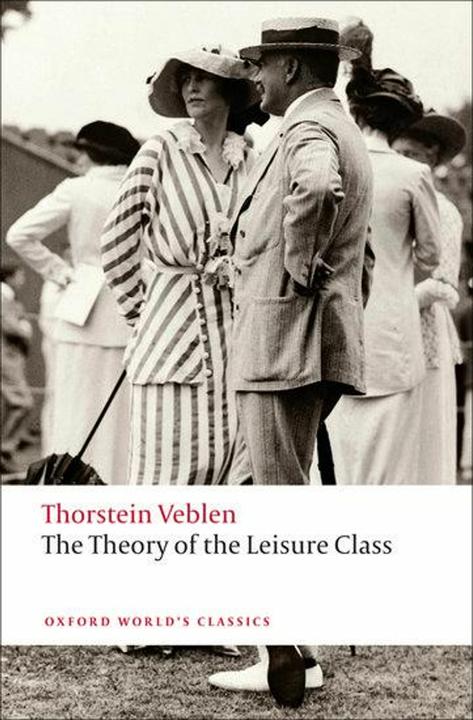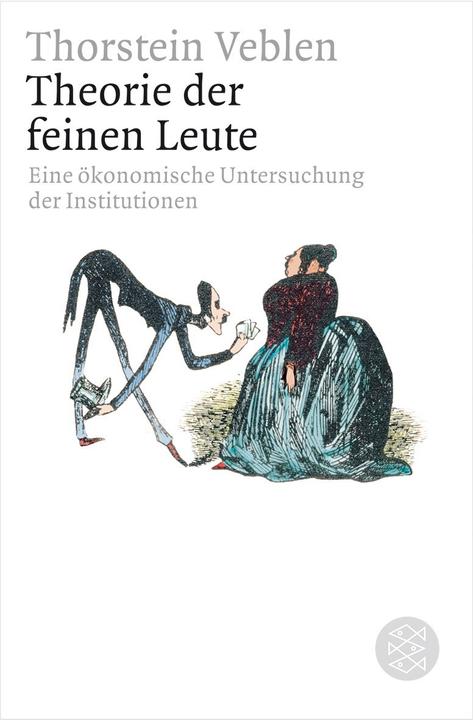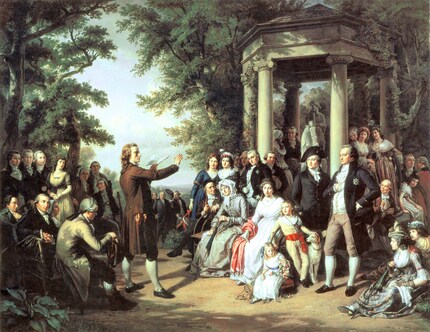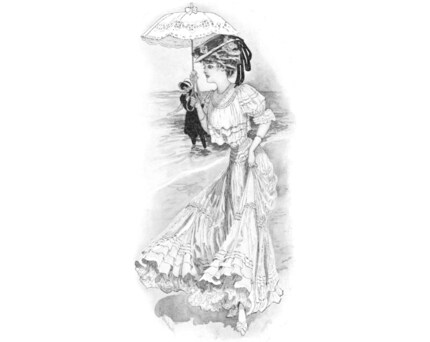
Background information
Why do we buy things we don't need?
by Kevin Hofer

As much as I like to convince myself otherwise, it is very rare that my purchases are motivated solely by their practical utility. Thorstein Veblen analysed consumer motivations as early as 1899 in his "Theory of the Leisure Class". It's hard to say whether the satirical nature of the work is intentional or not, but whatever the case, it's still worth reading today.
Why are we constantly buying things we don't need? That's the question our colleague Kevin Hofer asked himself a while back.
There are several very different explanations: psychological, social, economic. Thorstein Veblen developed a comprehensive theory on the matter as early as 1899, a theory that earned him many enmities. Not because it was obviously wrong, but because it revealed unpleasant facts that nobody wanted to hear. The title of the original version "Theory of the leisure class" was translated into French as "Théorie de la classe de loisir".

The Theory of the Leisure Class
English, Martha Banta, Thorstein Veblen, 2009

Veblen was an economist, but today we would rather associate his work with sociology, or even deny it any scientific quality. Indeed, he does not rely on any evidence: figures, statistics or studies. His theory is a pure construction of his mind, like the ideas of Freud, Marx (also an economist) or Darwin. Some passages read like social satire.
The central idea is simple: human beings buy things to establish their social status. Possession of certain products marks membership of a certain social class. This observation will come as no surprise to anyone; everyone is now familiar with the term "outward sign of wealth". Or this quote which is far older than the film "Fight Club":
We buy things we don’t need with money we don’t have to impress people we don’t like. (Nous achetons des choses dont nous n’avons pas besoin avec de l’argent que nous n’avons pas pour impressionner des gens que nous n’aimons pas.)
However, Veblen develops a detailed theory from this premise that allows him to explain the most varied aspects of human behaviour. As well as consumerism, he discusses the position of women in society, fashion diktats, beauty canons, the glorification of war, hunting and violence, religious rituals or why city dwellers are more fashionable than country dwellers.
This theory of human behaviour is based on the assumption that the human being is the most fashionable person in the world.
According to Veblen, in all human societies - apart from primitive peoples - there exists a privileged class eager to display its superiority. What changes over time are the methods used to demonstrate this power.
Before the industrial revolution, the number of products was very limited compared with today. Even the privileged therefore owned very little. Their privilege lay mainly in having servants. In other words, they don't have to work.
This privilege is defended, but not out of laziness. According to Veblen, every human being is naturally endowed with a "work instinct", i.e. they are willingly inclined to do something. But convention forbids it. This ostentatious idleness serves above all to establish an individual's power and prestige. This is why "it is not enough to possess wealth and power. They must be apparent, for only thus do they inspire respect."
Veblen calls this "ostentatious idleness".
One could imagine a person giving every appearance of idleness while working hard in secret. So the difficulty for members of the upper class is proving that they're not doing anything productive, even when they're on their own. The solution is to show off their talents in activities that are not productive or that take an extremely long time to learn. Examples include mastering musical instruments, complex rules of politeness or the refined art of conversation. The person who masters all these things that are absolutely useless to human survival is thus showing that they have a lot of free time.

The privileged naturally try to outbid each other. Ostentatious idleness ends up taking absurd forms. Those who can afford it then hire more servants than they need to offload their work. This too is an outward sign of wealth. There are thus people among the servants who do not perform any productive work; these dominate the hierarchy of servants.
They certainly perform tasks so that everyone can see that they are indeed servants. One principle emerges, however: the less necessary the task, the more it testifies to the wealth and power of the employer. For example, a high-ranking servant will welcome guests, but will never carry their luggage - this task is entrusted to a lower-ranking employee. With such complex ceremonial, the owner shows that he can afford all the staff expenses. The more unreasonable, the better.
With capitalism and industrialisation, the importance of goods increases dramatically. On the one hand, because valuable goods multiply and make it easier to stand out. On the other hand, because these goods go hand in hand with machines that work in place of human beings and replace domestic servants. Wealth is increasingly defined as an accumulation of goods. To this corresponds the labour-value, a 19th century economic theory. It states that the value of a commodity is made up of the labour time required to produce it.
Goods are therefore in a sense the result of the labour of domestic servants. Logically, goods must also represent a luxurious waste if they are supposed to show that the buyer is rich and powerful. The consequence is clear: goods are bought not in spite of, but precisely because they are useless. The buyer shows that he or she is rich enough to afford unnecessary things. Conspicuous consumption was born.
Of course, few outward signs of wealth are completely useless, but surprisingly many have irrational components. Veblen observes, for example, the preference of the wealthy for handmade products, whose quality is no better than industrially produced ones, but which are simply more expensive. According to his theory, these products are mainly bought because not everyone can afford them.

The Theory of the Leisure Class
English, Martha Banta, Thorstein Veblen, 2009

If prodigality marks membership of a privileged class, it is important that it meets social norms. It is therefore not a question of throwing money away, but of doing so in the most fashionable way. Veblen therefore devotes an entire chapter to aesthetics and questions of taste.
Handmade objects are often beautiful, but this is not the real reason why they are prized. They are sought after because they are expensive, because of "our preference for expensive objects that we cloak in the mask of beauty."
Veblen notes that, as a general rule, many things are considered beautiful because they are expensive, rather than the other way around. Flowers, which are certainly beautiful but grow everywhere and are therefore accessible to everyone, are considered weeds. Conversely, ugly but rare domestic animals are considered beautiful: "Many people even find beautiful a breed of dog that an amateur has created by cross-breeding until the animal is unrecognisable. In these breeds of dog, [...] the aesthetic value is more or less proportional to the degree of absurdity and inconstancy of the fashion responsible for breeding such monstrosities."The reason: "The commercial value of these hideous creatures rests on a high production cost."

Clothing occupies a prominent place in questions of taste. Utilitarian value plays a completely secondary role. Fashion lends itself particularly well to conspicuous consumption because it immediately signals membership of a social class. Upper-class fashion is always designed to restrict physical labour. Class people thus kill two birds with one stone by satisfying both the imperatives of demonstrative consumption and idleness.

The consumption of unnecessarily expensive goods that correspond to good taste is not just about things that are flaunted, but also things like underwear or household items. In fact, people unconsciously follow this pattern and bow to a general way of thinking and behaving that affects all areas.
Ostentatious consumption is not limited to the affluent classes. Less fortunate people are very keen not to appear too deprived. "No class, not even the poorest, renounces conspicuous consumption altogether", writes Veblen. Even if this means painful deprivation for those close to them. According to Veblen, each class envies the class directly above it, not the elite. This is because it lends itself to direct comparison, and "envious comparison" is the driving force behind conspicuous consumption.
The latter is less prevalent in the countryside than in the city, because people know each other well enough to know their neighbours' financial situation. In this case, it is difficult and pointless to pretend to be rich. In the city, the situation is different. Appearances immediately signal which class you belong to.
Ostentatious consumption is not at all irrational. It fulfils an economic objective. An individual's economic situation depends largely on the environment he or she frequents. This is why the purchase of certain symbols of social success is necessary. This is still the case today: a financial investment specialist has to present himself to his best clients at the wheel of an exorbitant car, but it is an investment that pays off.
According to Veblen, the first social classes to appear in human history have their origins in the division of labour between men and women. Originally, men's work included hunting and warfare, while women were responsible for gathering food. As only men's work was considered dangerous, it was the only work that could be described as heroic. At the same time, men's work requires brutality and predation. These characteristics predestine men to oppress women.
As a result, "there is reason to believe that property was originally exercised over people, and women in particular. The probable reasons are: 1. the penchant for authoritarianism and the exercise of coercion, 2. the value of women as living witnesses to the bravery of men, and 3. the interest of their work."
In one sentence.
In one sentence, Veblen sums up the motivations of classical machismo. I find this reasoning remarkable given that the author lived in an extremely patriarchal era. It shows the independence of his thought.
Veblen also noted that the female ideal of beauty adapts to the function assigned to it by the male world. As long as men saw women primarily as a work force, they had to be "imposing and buxom" - and there was no question of hiding these qualities. On the other hand, in a society where demonstrative idleness also applies to women, they should be as graceful, slim and even slender as possible. This society appreciates the corset, which not only prevents any productive work, but also enhances a weakened body.

This eccentric character's book is far from above suspicion. It is based above all on allegations. The author cherry-picks the examples and aspects that support his theory, ignoring or relativising the rest. Nevertheless, his idea is broadly convincing and everyone will find current examples to back it up.
Veblen attacks all influential circles at once: the rich, the nobles who do not work, the political class, the Church, but also the scholars, of which he himself is one. Indeed, he never shied away from deriding academia. So it's hardly surprising that he ended his life completely isolated and destitute.
My interest in IT and writing landed me in tech journalism early on (2000). I want to know how we can use technology without being used. Outside of the office, I’m a keen musician who makes up for lacking talent with excessive enthusiasm.
Interesting facts about products, behind-the-scenes looks at manufacturers and deep-dives on interesting people.
Show all